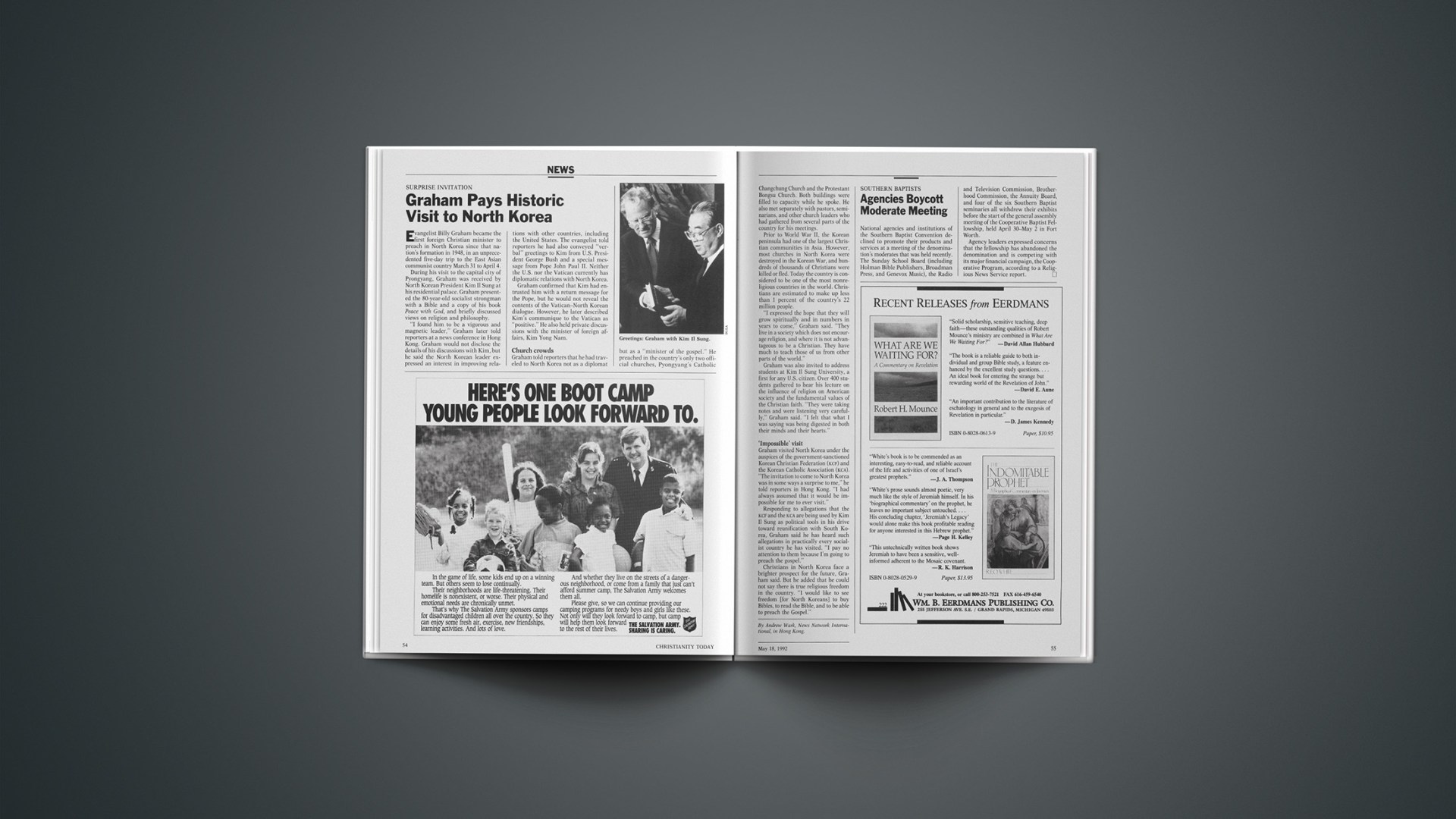Evangelist Billy Graham became the first foreign Christian minister to preach in North Korea since that nation’s formation in 1948, in an unprecedented five-day trip to the East Asian communist country March 31 to April 4.
During his visit to the capital city of Pyongyang, Graham was received by North Korean President Kim Il Sung at his residential palace. Graham presented the 80-year-old socialist strongman with a Bible and a copy of his book Peace with God, and briefly discussed views on religion and philosophy.
“I found him to be a vigorous and magnetic leader,” Graham later told reporters at a news conference in Hong Kong. Graham would not disclose the details of his discussions with Kim, but he said the North Korean leader expressed an interest in improving relations with other countries, including the United States. The evangelist told reporters he had also conveyed “verbal” greetings to Kim from U.S. President George Bush and a special message from Pope John Paul II. Neither the U.S. nor the Vatican currently has diplomatic relations with North Korea.
Graham confirmed that Kim had entrusted him with a return message for the Pope, but he would not reveal the contents of the Vatican-North Korean dialogue. However, he later described Kim’s communique to the Vatican as “positive.” He also held private discussions with the minister of foreign affairs, Kim Yong Nam.
Church Crowds
Graham told reporters that he had traveled to North Korea not as a diplomat but as a “minister of the gospel.” He preached in the country’s only two official churches, Pyongyang’s Catholic Changchung Church and the Protestant Bongsu Church. Both buildings were filled to capacity while he spoke. He also met separately with pastors, seminarians, and other church leaders who had gathered from several parts of the country for his meetings.
Prior to World War II, the Korean peninsula had one of the largest Christian communities in Asia. However, most churches in North Korea were destroyed in the Korean War, and hundreds of thousands of Christians were killed or fled. Today the country is considered to be one of the most nonreligious countries in the world. Christians are estimated to make up less than 1 percent of the country’s 22 million people.
“I expressed the hope that they will grow spiritually and in numbers in years to come,” Graham said. “They live in a society which does not encourage religion, and where it is not advantageous to be a Christian. They have much to teach those of us from other parts of the world.”
Graham was also invited to address students at Kim Il Sung University, a first for any U.S. citizen. Over 400 students gathered to hear his lecture on the influence of religion on American society and the fundamental values of the Christian faith. “They were taking notes and were listening very carefully,” Graham said. “I felt that what I was saying was being digested in both their minds and their hearts.”
‘Impossible’ Visit
Graham visited North Korea under the auspices of the government-sanctioned Korean Christian Federation (KCF) and the Korean Catholic Association (KCA). “The invitation to come to North Korea was in some ways a surprise to me,” he told reporters in Hong Kong. “I had always assumed that it would be impossible for me to ever visit.”
Responding to allegations that the KCF and the KCA are being used by Kim Il Sung as political tools in his drive toward reunification with South Korea, Graham said he has heard such allegations in practically every socialist country he has visited. “I pay no attention to them because I’m going to preach the gospel.”
Christians in North Korea face a brighter prospect for the future, Graham said. But he added that he could not say there is true religious freedom in the country. “I would like to see freedom [for North Koreans] to buy Bibles, to read the Bible, and to be able to preach the Gospel.”
By Andrew Wark, News Network International, in Hong Kong.
Southern Baptists
Agencies Boycott Moderate Meeting
National agencies and institutions of the Southern Baptist Convention declined to promote their products and services at a meeting of the denomination’s moderates that was held recently. The Sunday School Board (including Holman Bible Publishers, Broadman Press, and Genevox Music), the Radio and Television Commission, Brotherhood Commission, the Annuity Board, and four of the six Southern Baptist seminaries all withdrew their exhibits before the start of the general assembly meeting of the Cooperative Baptist Fellowship, held April 30–May 2 in Fort Worth.
Agency leaders expressed concerns that the fellowship has abandoned the denomination and is competing with its major financial campaign, the Cooperative Program, according to a Religious News Service report.










